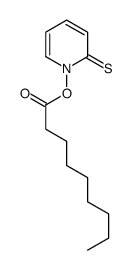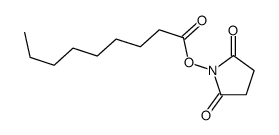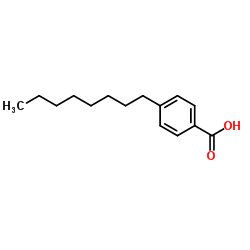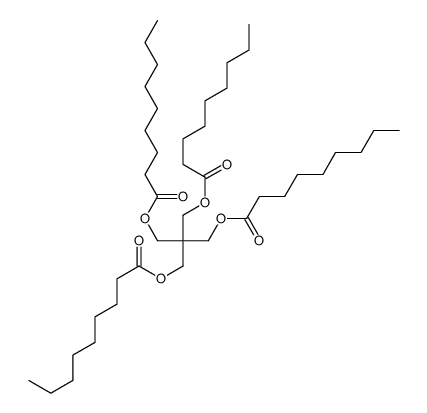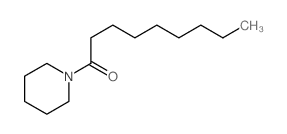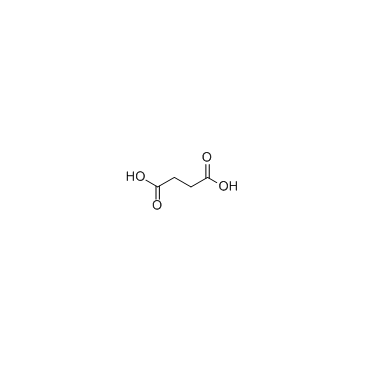112-05-0
| 中文名 | 正壬酸 |
|---|---|
| 英文名 | pelargonic acid |
| 中文别名 |
天竺葵酸
风吕草酸 |
| 英文别名 |
nonanic acid
n-Nonanoic acid NONANOIC-D4 ACID NONANOIC ACID FOR SYNTHESIS Nonanoic acid nonyloic acid Nona-N-methyl-4,4',4''-methantriyl-tri-anilinium,Tris-jodid NONANOIC ACID/PELARGONIC ACID NONANOICACID(PELARGONICACID) nona-N-methyl-4,4',4''-methanetriyl-tri-anilinium,tris iodide Nonanoic acid (Pelargonic acid) noncarboxylic acid N-NONYLIC ACID NONANOIC ACID (PELARGONIC) Acid C9,Pelargonic acid Pelargonic Acid MFCD00004433 Nonoic acid EINECS 203-931-2 NO0NOIC ACID |
| 描述 | Nonanoic acid 是一种天然存在的具有九个碳原子的饱和脂肪酸。Nonanoic acid 显着减少细菌易位,增强抗菌活性,并显着增加猪 β-防御素 1 (pBD-1) 和 pBD-2 的分泌。 |
|---|---|
| 相关类别 | |
| 体外研究 | 壬酸通过组蛋白脱乙酰酶抑制上调内源性宿主防御肽增强肠上皮免疫屏障功能[1]。 |
| 参考文献 |
| 密度 | 0.906 g/mL at 25 °C(lit.) |
|---|---|
| 沸点 | 268-269 °C(lit.) |
| 熔点 | 9 °C(lit.) |
| 分子式 | C9H18O2 |
| 分子量 | 158.23800 |
| 闪点 | 212 °F |
| 精确质量 | 158.13100 |
| PSA | 37.30000 |
| LogP | 2.82160 |
| 外观性状 | 透明油性液体,带有一种不愉快的,腐臭的气味 |
| 蒸汽密度 | 5.5 (vs air) |
| 蒸汽压 | <0.1 mm Hg ( 20 °C) |
| 折射率 | n20/D 1.432(lit.) |
| 储存条件 | 1.储存于阴凉、通风的库房。远离火种、热源。防止阳光直射。保持容器密封。应与氧化剂、酸类分开存放,切忌混储。配备相应品种和数量的消 防器材。储区应备有泄漏应急处理设备和合适的收容材料。 2.工业品用塑料桶,每桶25kg。分析试剂用玻璃瓶装,每瓶500g。按一般化学品贮运。
|
| 稳定性 | 1. 有腐蚀性。小鼠经口LD5015mg/kg。静脉注射LD50224mg/kg。操作人员应穿戴防护用具。 2. 存在于烤烟烟叶、白肋烟烟叶、香料烟烟叶、烟气中。 3. 天然存在于香蕉、啤酒、面包中。 4. 有强烈的刺激性。 |
| 水溶解性 | NEGLIGIBLE |
| 分子结构 | 五、分子性质数据: 1、 摩尔折射率:45.43 2、 摩尔体积(cm3/mol):171.7 3、 等张比容(90.2K):412.0 4、 表面张力(dyne/cm):33.1 5、 极化率(10-24cm3):17.96 |
| 计算化学 | 1、 疏水参数计算参考值(XlogP):3.5 2、 氢键供体数量:1 3、 氢键受体数量:2 4、 可旋转化学键数量:7 5、 互变异构体数量: 6、 拓扑分子极性表面积(TPSA):37.3 7、 重原子数量:11 8、 表面电荷:0 9、 复杂度:99.7 10、 同位素原子数量:0 11、 确定原子立构中心数量:0 12、 不确定原子立构中心数量:0 13、 确定化学键立构中心数量:0 14、 不确定化学键立构中心数量:0 15、 共价键单元数量:1 |
| 更多 | 1. 性状:无色油状液体,工业品为淡黄色,微有特殊气味。 2. 密度(g/mL,20℃):0.905 3. 相对密度(20℃,4℃):0.9055 4. 熔点(ºC):12.4 5. 沸点(ºC,常压):255.6 6. 相对密度(25℃,4℃):0.9017 7. 折射率(n20D):1.4319 8. 常温折射率(n20):1.4322 9. 常温折射率(n25):1.4302 10. 自燃点或引燃温度(ºC):405 11. 液相标准燃烧热(焓)(kJ·mol-1):-5454.30 12. 饱和蒸气压(kPa,20 ºC):0.04 13. 液相标准声称热(焓)( kJ·mol-1):-659.73 14. 临界温度(ºC):438.85 15. 临界压力(KPa):2.35 16. 溶度参数(J·cm-3)0.5:21.768 17. van der Waals面积(cm2·mol-1):1.463×1010 18. van der Waals体积(cm3·mol-1):104.800 19. 溶解性:溶于乙醇、氯仿和乙醚等有机溶剂,不溶于水。 20.气相标准燃烧热(焓)(kJ·mol-1):-5537.98 21. 气相标准声称热(焓)( kJ·mol-1) :-575.3 22. 液相标准热熔(J·mol-1·K-1):358.7 23. 闪点(ºC):100 |
Synonym:Pelargonic Acid Section 2 - COMPOSITION, INFORMATION ON INGREDIENTS
Risk Phrases: 34 Section 3 - HAZARDS IDENTIFICATION EMERGENCY OVERVIEW
Causes burns. Potential Health Effects Eye: Causes eye burns. Causes redness and pain. Skin: Causes skin burns. Causes redness and pain. Ingestion: Causes gastrointestinal tract burns. Inhalation: Causes chemical burns to the respiratory tract. Chronic: Chronic exposure may cause effects similar to those of acute exposure. Section 4 - FIRST AID MEASURES Eyes: Get medical aid immediately. Do NOT allow victim to rub eyes or keep eyes closed. Extensive irrigation with water is required (at least 30 minutes). Skin: Get medical aid immediately. Immediately flush skin with plenty of water for at least 15 minutes while removing contaminated clothing and shoes. Ingestion: If swallowed, do NOT induce vomiting. Get medical aid immediately. If victim is fully conscious, give a cupful of water. Never give anything by mouth to an unconscious person. Inhalation: Get medical aid immediately. Remove from exposure and move to fresh air immediately. If breathing is difficult, give oxygen. Do NOT use mouth-to-mouth resuscitation. If breathing has ceased apply artificial respiration using oxygen and a suitable mechanical device such as a bag and a mask. Notes to Physician: Treat symptomatically and supportively. Section 5 - FIRE FIGHTING MEASURES General Information: As in any fire, wear a self-contained breathing apparatus in pressure-demand, MSHA/NIOSH (approved or equivalent), and full protective gear. During a fire, irritating and highly toxic gases may be generated by thermal decomposition or combustion. Will burn if involved in a fire. Vapors may be heavier than air. They can spread along the ground and collect in low or confined areas. Runoff from fire control or dilution water may cause pollution. Extinguishing Media: Use water spray to cool fire-exposed containers. Use water spray, dry chemical, carbon dioxide, or chemical foam. Section 6 - ACCIDENTAL RELEASE MEASURES General Information: Use proper personal protective equipment as indicated in Section 8. Spills/Leaks: Absorb spill with inert material (e.g. vermiculite, sand or earth), then place in suitable container. Avoid runoff into storm sewers and ditches which lead to waterways. Clean up spills immediately, observing precautions in the Protective Equipment section. Provide ventilation. Section 7 - HANDLING and STORAGE Handling: Do not breathe dust, vapor, mist, or gas. Do not get in eyes, on skin, or on clothing. Keep container tightly closed. Do not ingest or inhale. Use only in a chemical fume hood. Discard contaminated shoes. Storage: Store in a cool, dry place. Store in a tightly closed container. Corrosives area. Section 8 - EXPOSURE CONTROLS, PERSONAL PROTECTION Engineering Controls: Facilities storing or utilizing this material should be equipped with an eyewash facility and a safety shower. Use adequate ventilation to keep airborne concentrations low. Exposure Limits CAS# 112-05-0: Personal Protective Equipment Eyes: Wear chemical splash goggles. Skin: Wear appropriate protective gloves to prevent skin exposure. Clothing: Wear appropriate protective clothing to prevent skin exposure. Respirators: Follow the OSHA respirator regulations found in 29 CFR 1910.134 or European Standard EN 149. Use a NIOSH/MSHA or European Standard EN 149 approved respirator if exposure limits are exceeded or if irritation or other symptoms are experienced. Section 9 - PHYSICAL AND CHEMICAL PROPERTIES Physical State: Clear liquid Color: colorless Odor: Not available. pH: Not available. Vapor Pressure: Not available. Viscosity: Not available. Boiling Point: 254 deg C Freezing/Melting Point: 12.5 deg C Autoignition Temperature: Not available. Flash Point: 114 deg C ( 237.20 deg F) Explosion Limits, lower: 1.20 Explosion Limits, upper: Not available. Decomposition Temperature: Solubility in water: 0.3g/l Specific Gravity/Density: 0.900 Molecular Formula: C9H18O2 Molecular Weight: 158.1248 Section 10 - STABILITY AND REACTIVITY Chemical Stability: Not currently available. Conditions to Avoid: None reported. Incompatibilities with Other Materials: Bases, oxidizing agents, reducing agents. Hazardous Decomposition Products: Carbon monoxide, carbon dioxide. Hazardous Polymerization: Has not been reported Section 11 - TOXICOLOGICAL INFORMATION RTECS#: CAS# 112-05-0: RA6650000 LD50/LC50: CAS# 112-05-0: Draize test, rabbit, eye: 91 mg Severe; Draize test, rabbit, eye: 100 uL Mild; Draize test, rabbit, skin: 500 mg/24H Moderate; Oral, mouse: LD50 = >5 gm/kg; Oral, rat: LD50 = >5 gm/kg; Skin, rat: LD50 = >2 gm/kg. Carcinogenicity: n-Nonanoic acid - Not listed by ACGIH, IARC, or NTP. Other: See actual entry in RTECS for complete information. Section 12 - ECOLOGICAL INFORMATION Ecotoxicity: Fish: Pseudomonas putida: Section 13 - DISPOSAL CONSIDERATIONS Dispose of in a manner consistent with federal, state, and local regulations. Section 14 - TRANSPORT INFORMATION IATA Shipping Name: CORROSIVE LIQUID, ACIDIC, ORGANIC, N.O.S.* Hazard Class: 8 UN Number: 3265 Packing Group: III IMO Shipping Name: CORROSIVE LIQUID, ACIDIC, ORGANIC, N.O.S. Hazard Class: 8 UN Number: 3265 Packing Group: III RID/ADR Shipping Name: CORROSIVE LIQUID, ACIDIC, ORGANIC, N.O.S. Hazard Class: 8 UN Number: 3265 Packing group: III Section 15 - REGULATORY INFORMATION European/International Regulations European Labeling in Accordance with EC Directives Hazard Symbols: C Risk Phrases: R 34 Causes burns. Safety Phrases: S 26 In case of contact with eyes, rinse immediately with plenty of water and seek medical advice. S 28A After contact with skin, wash immediately with plenty of water. S 36/37/39 Wear suitable protective clothing, gloves and eye/face protection. S 45 In case of accident or if you feel unwell, seek medical advice immediately (show the label where possible). WGK (Water Danger/Protection) CAS# 112-05-0: No information available. Canada CAS# 112-05-0 is listed on Canada's DSL List. CAS# 112-05-0 is listed on Canada's Ingredient Disclosure List. US FEDERAL TSCA CAS# 112-05-0 is listed on the TSCA inventory. SECTION 16 - ADDITIONAL INFORMATION N/A |
|
毒理学数据: 1、 急性毒性:小鼠经口LD50:5000mg/kg 大鼠经口LD50:5000mg/kg; 大鼠皮肤LD5O:2000mg/kg 兔子皮肤LD5O:5000mg/kg 2、 对皮肤和眼睛的刺激:兔子皮肤500mg/24H, 有中等强度的刺激。豚鼠皮肤100%,有严重的刺激作用。对兔子眼睛91mg,有严重的刺激作用。 生态学数据: 对水有稍微的危害。 CHEMICAL IDENTIFICATION
HEALTH HAZARD DATAACUTE TOXICITY DATA
|
| 符号 |

GHS05 |
|---|---|
| 信号词 | Danger |
| 危害声明 | H314 |
| 警示性声明 | P280-P303 + P361 + P353-P304 + P340 + P310-P305 + P351 + P338 |
| 个人防护装备 | Faceshields;full-face respirator (US);Gloves;Goggles;multi-purpose combination respirator cartridge (US);type ABEK (EN14387) respirator filter |
| 危害码 (欧洲) | C:Corrosive; |
| 风险声明 (欧洲) | R34 |
| 安全声明 (欧洲) | S26-S28-S36/37/39-S45-S28A |
| 危险品运输编码 | UN 3265 8/PG 3 |
| WGK德国 | 1 |
| RTECS号 | RA6650000 |
| 包装等级 | III |
| 危险类别 | 8 |
| 海关编码 | 2915900090 |
| 上游产品 10 | |
|---|---|
| 下游产品 10 | |
| 海关编码 | 2915900090 |
|---|---|
| 中文概述 | 2915900090. 其他饱和无环一元羧酸及其酸酐(酰卤、过氧)化物、过氧酸及其卤化、硝化、磺化、亚硝化衍生物. 增值税率:17.0%. 退税率:9.0%. 监管条件:AB(入境货物通关单,出境货物通关单). 最惠国关税:5.5%. 普通关税:30.0% |
| 申报要素 | 品名, 成分含量, 用途 |
| 监管条件 | A.入境货物通关单 B.出境货物通关单 |
| 检验检疫 | R.进口食品卫生监督检验 S.出口食品卫生监督检验 M.进口商品检验 N.出口商品检验 |
| Summary | 2915900090 other saturated acyclic monocarboxylic acids and their anhydrides, halides, peroxides and peroxyacids; their halogenated, sulphonated, nitrated or nitrosated derivatives VAT:17.0% Tax rebate rate:9.0% Supervision conditions:AB(certificate of inspection for goods inward,certificate of inspection for goods outward) MFN tariff:5.5% General tariff:30.0% |




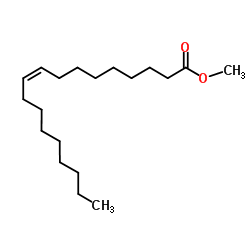
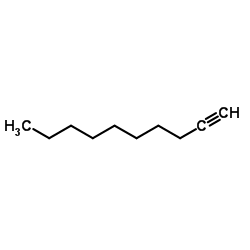
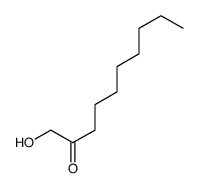



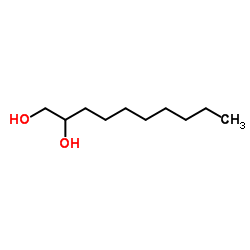

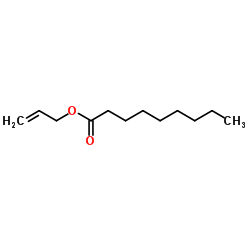
![2-methyl-2-[[(1-oxononyl)oxy]methyl]propane-1,3-diyl dinonan-1-oate结构式](https://image.chemsrc.com/caspic/008/10535-50-9.png)
